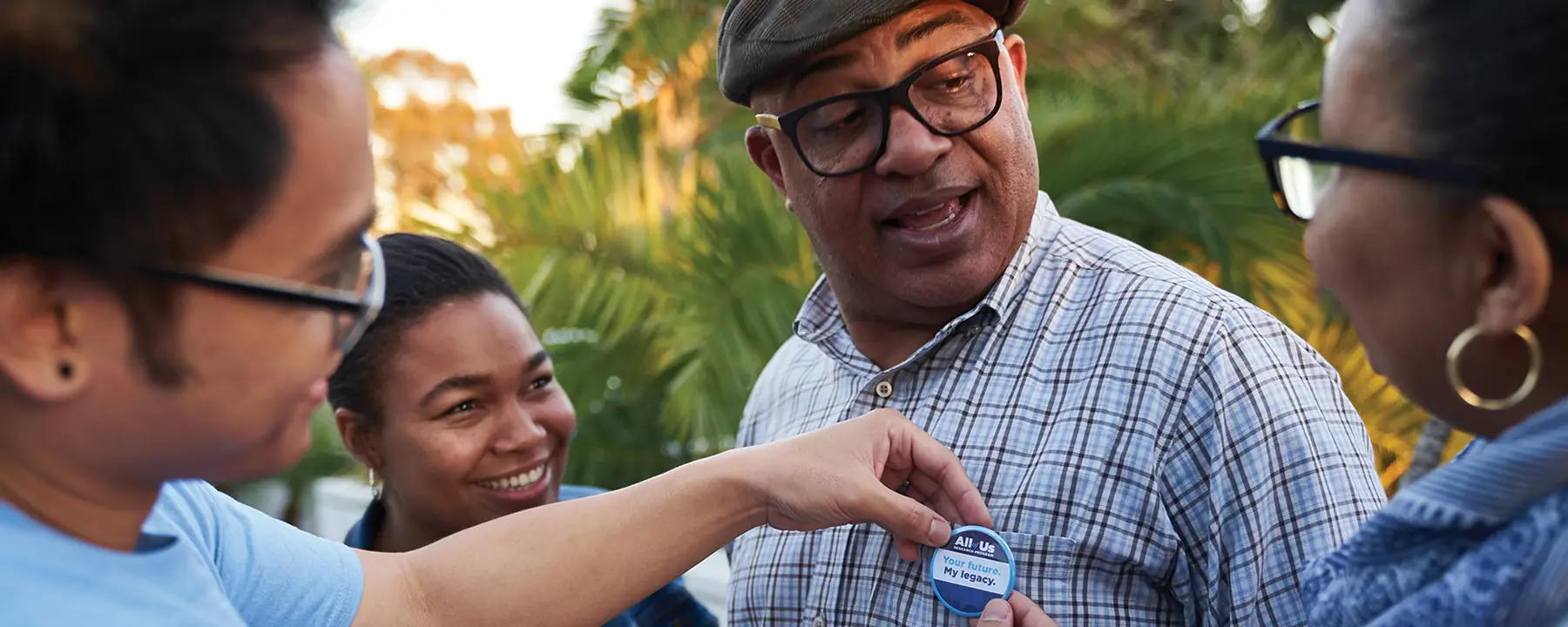Applying Human-Centered Design Principles and Developmental Evaluation to Engage Populations and Health Care Providers
Objective
To engage health care providers and members of various populations with the All of Us Research Program (All of Us).
Approach
Research, design, deliver, and evaluate digital engagement solutions with health care providers and members of all populations for health care providers and members of all populations.
Impact
Increase health care provider engagement with All of Us, support health care providers in engaging with patients and community members about All of Us and increase engagement across the entire All of Us participant journey.
Biomedical research participants need to reflect the various communities across the United States to drive health care innovation that benefits everyone. However, in the past, biomedical research has not been able to include members of all populations or those with complex diseases. Consequently, we know less about the overall health, effective treatments, and disease prevention for some populations, and as a result health care often uses a one-size-fits-all approach.
To fill this gap and help improve health care outcomes, the National Institutes of Health’s All of Us Research Program is working to enroll one million or more U.S. participants in a longitudinal research program. All of Us is collaborating with trusted intermediaries, like health care providers and community-based organizations, to develop a robust dataset that researchers can use to accelerate health research and medical breakthroughs, enabling individualized prevention, treatment, and care for all of us.
RTI International serves as one of the All of Us Engagement and Retention Innovator Awardees. In this role, RTI works with other consortium members and awardees to research, design, deliver, and evaluate digital solutions using a human-centered design, engagement marketing, and developmental evaluation approach. Human-centered design focuses on the needs of individuals and communities when developing solutions, engagement marketing fosters connections and builds trust with community members through active and intentional collaboration, and developmental evaluation prioritizes real-time data to inform ongoing decision making as part of the design process.
Engaging Populations and Health Care Providers in Biomedical Research
In Year 1, RTI conducted a landscape analysis and exploratory research to understand and identify challenges, gaps, and unmet needs related to engaging health care providers and members of various populations in biomedical research with All of Us. This work also identified strategies used by All of Us to promote engagement, retention, and activity completion among health care providers and community members.
A Human-Centered Design and Developmental Evaluation Approach
In Year 2, RTI focused on co-creating digital solutions to address challenges and support engagement with All of Us. We conducted more than 70 virtual workshops with more than 400 individuals to validate challenges identified in Year 1, brainstorm potential solutions, and test and refine almost 50 unique concepts (descriptive text and visual storyboards) for digital solutions.
A post-workshop evaluation showed that over 90% of workshop participants agreed or strongly agreed that the co-creation workshops made them feel more connected to All of Us. The ideas developed and validated in the workshops were shared with All of Us consortium partners and several ideas were prioritized for development.
Development of Digital Engagement Experiences
In Years 3 and 4, we are developing prototypes and conducting user and pilot testing in collaboration with consortium partners to support engagement, enrollment, and retention efforts. We are also collaborating with UTHealth Houston to develop two digital continuing education courses for health care professionals. Once development and pilot testing are complete, the products will be available for wider use by All of Us consortium partners.
Story-Based Videos
The collection of videos addresses potential challenges and barriers to participating in research and highlights the benefits of research participation.
Decide Later Tool
The Decide Later Tool is a web-based digital decision support tool designed to help community members make an informed decision about joining All of Us. Community members who want more information before joining All of Us can use the tool to select from a range of All of Us topics (e.g., data security). Users then receive a tailored email that provides information on the selected topics, and a link to a webpage with additional details.
The Arcade
The arcade is a set of web-based games to help community members learn about All of Us. Interested users will have the option to choose between interactive games that feature information about All of Us in a fun and engaging format.
Health Care Provider Continuing Education
Two continuing education (CE) courses will be available for health care providers. One CE is designed to increase health care providers’ knowledge about All of Us and the other focuses on genetic testing. The courses will provide educational content in a brief question-and-answer format delivered through email or text. Users will receive content over the course of several weeks, solidifying learning through consistent engagement with the content.
- National Institutes of Health (NIH)
- PRIDEnet at Stanford University School of Medicine
- UTHealth Houston





